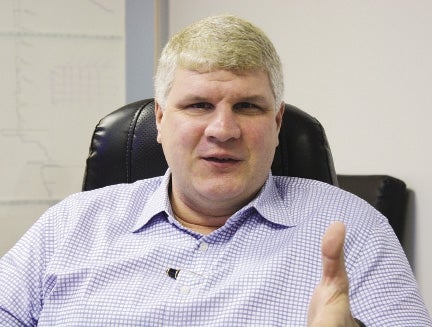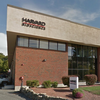Which way will Baker go on life sciences? Leaders wait on governor-elect
 Timothy Coleman of Worcester's Blue Ocean Manufacturing said more state funding would help accelerate drug development.
Timothy Coleman of Worcester's Blue Ocean Manufacturing said more state funding would help accelerate drug development.
If there's one clear economic development legacy Gov. Deval Patrick will leave behind after eight years in office, it's his advocacy for the state's life sciences industry.
The sector has enjoyed significant growth in a number of ways, from more commercial laboratory space to per-capita employment gains, helped by state funding.
According to the Massachusetts Life Sciences Center (MLSC), created as part of Patrick's 2008 Life Sciences Initiative, the amount of lab space jumped from about 16 million square feet in 2007 to 21.2 million in 2014. And the Bay State's life sciences sector leads in per-capita employment in the industry, ahead of other leading life sciences states, notably New Jersey, California, Pennsylvania and New York, all of which are bigger, the MLSC said.
In 2012, Massachusetts employed more than 113,000 in the industry, a figure supported in a June 2014 report by Northeastern University economists Barry Bluestone and Alan Clayton-Matthews. That's about as large as the state's construction industry, and it has grown 17.5 percent since 2006, even amid the Great Recession. During that same span, overall state job growth was 1.4 percent, according to the report.
But the gains made during the eight years of the Patrick administration don't mean Massachusetts is untouchable in life sciences, said Angus McQuilken, the MLSC's vice president for marketing and communications.
“There are other major players making investments as well,” McQuilken said of other states with large life sciences sectors. “If we don't continue, we can be certain that competitors will catch up to us.”
According to McQuilken, Massachusetts is on top because it has taken a comprehensive approach to life sciences investment, funding projects in all regions of the state and across multiple sectors. That's different than places like Texas, he said, where the state has focused largely on oncology investment.
To date, $500 billion has been spent on various Bay State projects of all sizes. Cambridge-based Genzyme, owned by drug giant Sanofi, benefited from a $14.3-million grant to the Town of Framingham for upgrades to its wastewater collection system, which allowed Genzyme to open a biomanufacturing facility there in 2012. Meanwhile, the MLSC helped recruit Israeli startup Rewalk Robotics, now of Marlborough, which recently completed an initial public offering of stock.
More changing of the guard
Industry stakeholders will be watching closely as Gov.-elect Charlie Baker lays out an agenda for supporting the life sciences industry. Patrick's 2008 initiative committed $1 billion to life sciences companies and initiatives over 10 years.
While that will end in 2018, McQuilken said funding decisions are made each year by various state departments and the Legislature, so the change in administration is significant. In addition, Senate President Therese Murray, a champion of life sciences investment, is also leaving, as is MLSC president and CEO Susan Windham-Bannister, who will step down when Patrick leaves office in early January.
“It's going to be important that everyone in a policy-making role after this election, at all levels, understand the importance of continued investment in the life sciences,” McQuilken said.
A spokesman for Baker did not return requests for comment by press time.
While Massachusetts has made strides under Patrick, Kevin O'Sullivan, president and CEO of the Massachusetts Biomedical Initiatives (MBI) in Worcester, hopes Baker will take on a new frontier: biomanufacturing.
O'Sullivan said much of the focus has been on funding academic and research-and-development initiatives, while efforts to boost biomanufacturing — particularly at small-scale life sciences companies — could use more attention.
Areas outside Boston, like the I-495 corridor and Worcester, make investment easier from a cost standpoint, O'Sullivan said.
O'Sullivan has a very concrete vision of how life sciences investment can continue to benefit Central Massachusetts, and the life sciences industry at large, if he can get the next administration on board.
In partnership with Worcester biomanufacturer Blue Ocean Manufacturing, O'Sullivan has advocated converting vacant space on Union Street in Worcester into a small-scale flex manufacturing facility, which would give small biologics manufacturers a place to produce their therapies for testing. The two organizations applied for a $5 million grant from the MLSC in September, which would have allowed them to outfit the 12,000-square-foot space with the necessary equipment. Their application was denied, but O'Sullivan said they'll try again after Baker takes office.
Baker toured the facility during a campaign stop in Worcester, O'Sullivan said. He also highlighted the proposal in an October debate in Worcester while talking up city's biomanufacturing potential.
“I kind of like that,” O'Sullivan said a few days before Baker's victory. “He knows about the plan (for the Union Street building).”
Blue Ocean CEO Timothy Coleman said this would fill a critical need for companies to create drugs that can treat cancer and other diseases, and it's a good opportunity for the state to invest in biomanufacturing.
MBI and the Massachusetts Biotechnology Council commissioned a report by professional services firm PricewaterhouseCoopers (PwC) which supports O'Sullivan's and Coleman's premise. The report said that, with its proximity to Boston, more affordable cost of living, available manufacturing buildings and high-quality educational institutions, “Worcester is well-positioned to form an innovative public-private partnership to become a leading biomanufacturing region … ”
Coleman is looking to launch initial-phase clinical trials in about 12 months under his other firm, Nemucore, a biologics startup that's developing a treatment for ovarian cancer. If Blue Ocean launches, it will provide testing space in the same building that houses offices for MBI and Nemucore, another biomanufacturer, as well as lab space for startups.
“Companies the size of mine need small lots so they can get the concept in the clinic,” Coleman said. “It's just going to take off.”









0 Comments